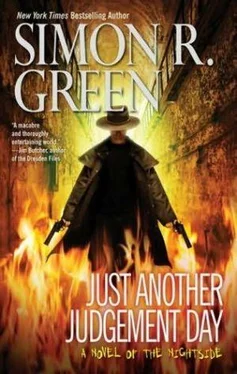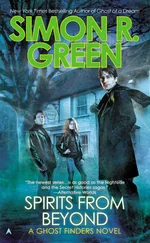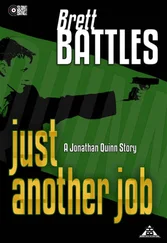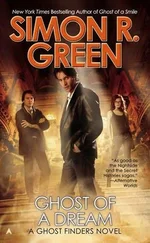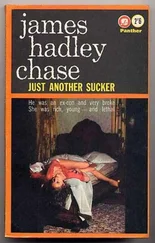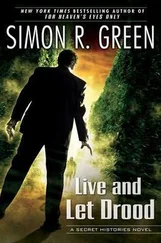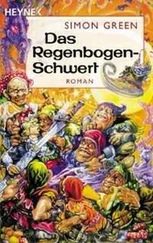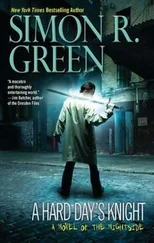“The customers never talk. Part of the deal. The crystals are very expensive, and there’s only a limited supply. There’s a waiting list to get on the waiting list. Precious Memories is in a position to pick and choose, and it does. So even though there is intense curiosity everywhere as to what the experience is like, no-one ever talks.”
“Oh come on,” said Suzie. “This is the Nightside. Someone always talks.”
“A few customers dropped a hint or two, and were immediately cut off,” I said. “They killed themselves.”
“Ah,” said Chandra. “The practice is addictive, perhaps?”
“Could be,” I said. “The crystals are supposed to be a safe way of observing or experiencing very extreme and unsafe things. Though, of course, that’s not for everyone. When you come to the Nightside, the risk is part of the game.”
“The door’s open,” said Suzie.
“Yes,” I said. “I Saw the Walking Man push it open, quite easily, as though all its locks and security measures were nothing to him.”
We looked at the door, standing slightly ajar.
“It seems . . . very quiet in there,” said Chandra. “I think we have a duty to investigate the situation.”
“Right,” said Suzie. “Try and stay out of the way when I start shooting.”
I pushed the door in, with one hand. No reaction, no alarms, no sound at all from inside. Not good. I led the way in, Suzie and Chandra pressing close behind me. The lobby of Precious Memories was perfectly normal—comfortable chairs, a nice carpet, tasteful prints on the walls, and an impressive state-of-the-art reception desk. All perfectly normal. Except for the bodies lying everywhere, and the blood splashed thickly across the walls, soaking into the rich carpet. Dozens of men and women, in expensive clothing, lying broken and bloodied with staring eyes, reaching out for help that never came. All of them shot to death, and not too long ago.
I moved cautiously forward, stepping over and around the bodies. Everything was still, and silent. Suzie had her shotgun in her hands. Chandra had his long, curved sword. Dead men and women covered the floor of the lobby, cut down where they stood. Huge chest wounds, gaping holes in backs, heads blown apart. The stench of spilled blood was so strong I could taste it in my mouth, and it squelched up out of the carpet as I trod on it. More blood ran down the walls, along with the occasional grey splash of brains. Some of the dead looked to be clients, some staff. Young and old, they’d all been murdered with brutal efficiency. Heart shots, head shots, and in the back if they’d tried to run. Even the receptionist was dead, sitting slumped in her chair behind her desk. She was just a teenager, but the Walking Man had shot her through the left eye.
Chandra Singh moved quickly through the lobby, kneeling here and there to check for a possible pulse, searching increasingly desperately for anyone who might have survived. Suzie swivelled back and forth, searching for a target, for someone she could shoot. The dead didn’t bother her. She’d seen worse. I stood in the middle of the lobby, looking around for some sign of where the Walking Man might have gone, but the bodies kept drawing my attention back to them. Forty-eight in total, mostly men. Gathered together in the lobby for some kind of meeting. Some had been gut-shot, their insides splashed across the carpet. Some looked like they’d tried to surrender. It hadn’t saved them. The wrath of God in the world of men . . . What could have been going on here to make him so angry? There was another door, at the far end of the lobby, with a single bloody hand-print on it.
“This is an abomination,” said Chandra Singh, quite simply. “There cannot be any justification for such . . . slaughter, such human butchery.”
“This is bad,” I said. “Even for the Nightside.”
“He walked in and killed everyone he saw,” said Suzie. “What could they have been guilty of, to make him so angry? Or were they just in his way?”
“I hunt monsters,” said Chandra. “I have dedicated my life to protecting people from the things that prey on them. I never thought I would see the day when I would end up on the trail of a human monster. How could a man of God do something like this?”
I moved over to the reception desk. Set directly before the dead receptionist was a single memory crystal. Someone had drawn an arrow in blood on the desk top, pointing to the crystal. We all gathered together before the desk and studied the crystal carefully, without touching it.
“Did he leave this here, for us?” said Chandra. “His . . . explanation, or justification, for this atrocity?”
“Could be a clue as to where he’s gone,” said Suzie. “Hope so. I really want to kill this one.”
“I’ll try it,” I said. “If it looks like it’s a trap, or the memory’s . . . getting to me, slap the bloody thing out of my hand.”
“Got it,” said Suzie.
She put her shotgun away, and moved in close beside me as I nerved myself to pick up the crystal. It looked like such a small, innocent thing, but I didn’t want to touch it. I didn’t trust it. And . . . I wasn’t at all sure I wanted to see what was in it. The things the Walking Man had done here. But in the end I picked it up anyway. Because that was the job.
To my surprise, a giant screen appeared, floating in mid air in the middle of the lobby. And from Suzie and Chandra’s immediate reactions, it was clear they could see it, too.
“This isn’t what I was expecting,” I said.
“He must have modified the crystal,” said Chandra, frowning. “I didn’t know you could do that.”
“You can’t,” I said. “At least, not without access to really high tech.”
“He probably just touched it,” said Suzie. “And it had no choice but to do what he and his god wanted.”
We thought about that. What could be so terrible, that we couldn’t experience it first hand, but only on the screen?
“How do we activate the thing?” said Suzie.
“I don’t know,” I said. “Maybe you just say Start! ”
And the huge screen came to life and showed us awful things.
It wasn’t a memory. Or a sensory experience. It wasn’t even POV. It showed us a view of the lobby, with men and women standing around, talking quietly. They all seemed quite happy, and relaxed. Ordinary men and women, going about their ordinary business. They had no idea what was coming. No idea who was coming for them. They all looked round in surprise as the door suddenly opened, all the locks and security measures disengaging by themselves. And then the Walking Man strode in, with a smile on his lips and murder in his eyes, his long duster coat flapping about him like some Wild West preacher come to dispense brimstone and hellfire.
The men and women were still looking at him, puzzled and a little taken aback, like hosts presented with an unexpected guest. I wanted to call out and warn them, but there was no way my voice could reach them. The Walking Man’s coat opened by itself, falling back to reveal a simple white shirt over worn blue jeans and two large pistols holstered head to head across his flat stomach. The guns seemed almost to leap into his hands as he reached for them; old-fashioned Wild West pistols, with long barrels and wood grips. Peacemakers, the guns Wyatt Earp and his brothers used to tame helltowns like Tombstone. The Walking Man was still smiling when he began killing people.
He strode forward into the lobby, shooting the men and women before him with casual, practised skill. No warnings, no chance to surrender, no mercy. He shot them in the head or in the chest, and he never needed more than one bullet. The screaming started then, as surprise turned to shock, and to horror. People fell back as bodies crashed to the floor, and blood and brains flew on the air. The Walking Man never missed, and he never shot to wound, and though he fired and fired without pausing his guns never ran out of bullets. By now the lobby was full of shouting and screaming and pleading, and the sound of continuous gunfire. Some tried to run, and the Walking Man shot them in the back, or in the back of the head.
Читать дальше
